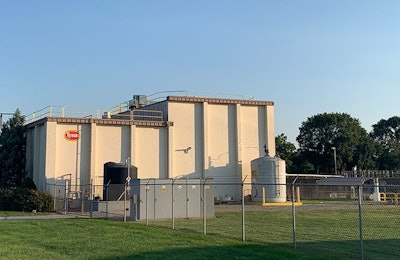
Wastewater treatment is a priority for the entire team at Tyson Food’s New Holland Complex.
For its dedication to clean water and exceptional treatment performance, Tyson Foods Inc.’s broiler and further processing complex in New Holland, Pennsylvania, was selected as the winner of the 2020 U.S. Poultry & Egg Association’s Clean Water Award in the full treatment category. Beyond water treatment, the judging committee for the 2020 awards was impressed with the team attitude exhibited by every level of the operation, from management to wastewater operators.
The full treatment category covers plants treating wastewater in accordance with National Pollutant Discharge Elimination System permits allowing the facilities to discharge into a receiving stream or final land application system. To be eligible, a facility must have a minimum of two years of no significant non-compliances or notices of violations or any other type of enforcement action. Judging is based upon training, unique processes utilized for treatment, community outreach, wildlife management, water conservation and general environmental stewardship.

From left: John Farrier and Julie Bard Ziegler, Tyson Foods. (Paul Bredwell)
Wastewater treatment
Tyson’s New Holland complex processes 620,000 birds and 2.5 million pounds of cooked product per week. The complex houses a rendering operation, too. Its water treatment operation handles an average flow of 698,000 gallons of concentrated wastewater daily.
To complicate matters, the plant is located in the Chesapeake Bay watershed and therefore is subject to strict rules concerning discharge of nitrogen and phosphorus. The judging committee looked favorably on the plant’s ability to meet its requirements for reducing the presence of these potential pollutants.
Sustainability efforts
The New Holland Complex is taking steps to reduce its water usage and its environmental footprint.
In 2019, it partnered with EDL Energy to expand its infrastructure for using landfill-generated gas in place of natural gas as a fuel source. Landfill-generated gas is used in broilers and thermal fluid heaters at the plant. The gas, a mix of methane, carbon dioxide and other organic compounds, is collected from a local landfill where it was previously flared off.
The complete team at the complex regularly reviews how the operation can save more water by measures such as fixing leaks, repairing equipment or limited water used during downtime. Since establishing a baseline to measure its water use reduction efforts against, the facility has decreased its overall water consumption by 47.5 million gallons per year, or about 16% from its 2015 baseline.
The facility also takes part in a local waste to energy project. By Tyson’s estimates, since 2019 trash collected from the New Holland operation generated more than 1.5 million kilowatt hours of renewable energy. This offset 2,653 tons of carbon emissions from that plant during that year.

















